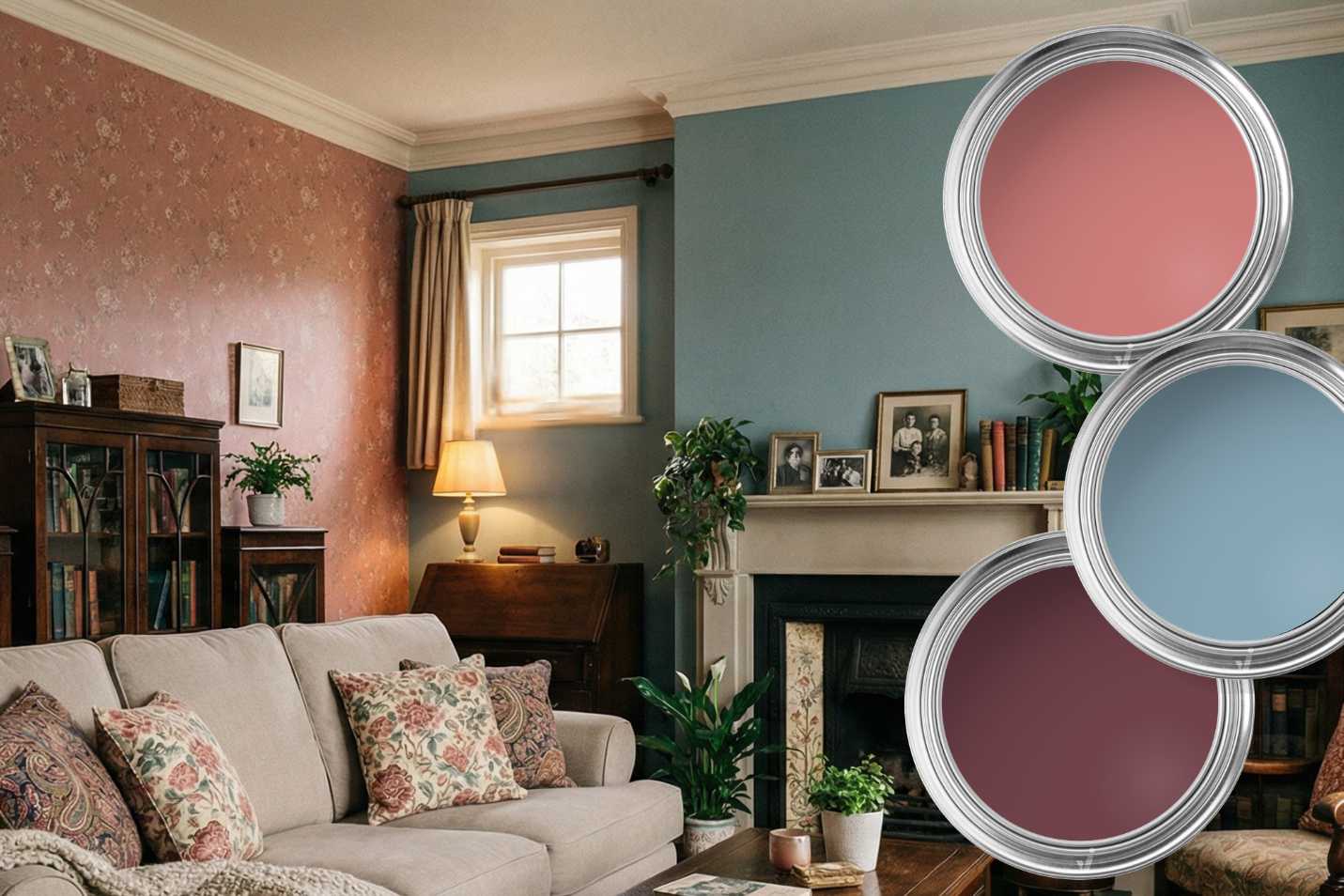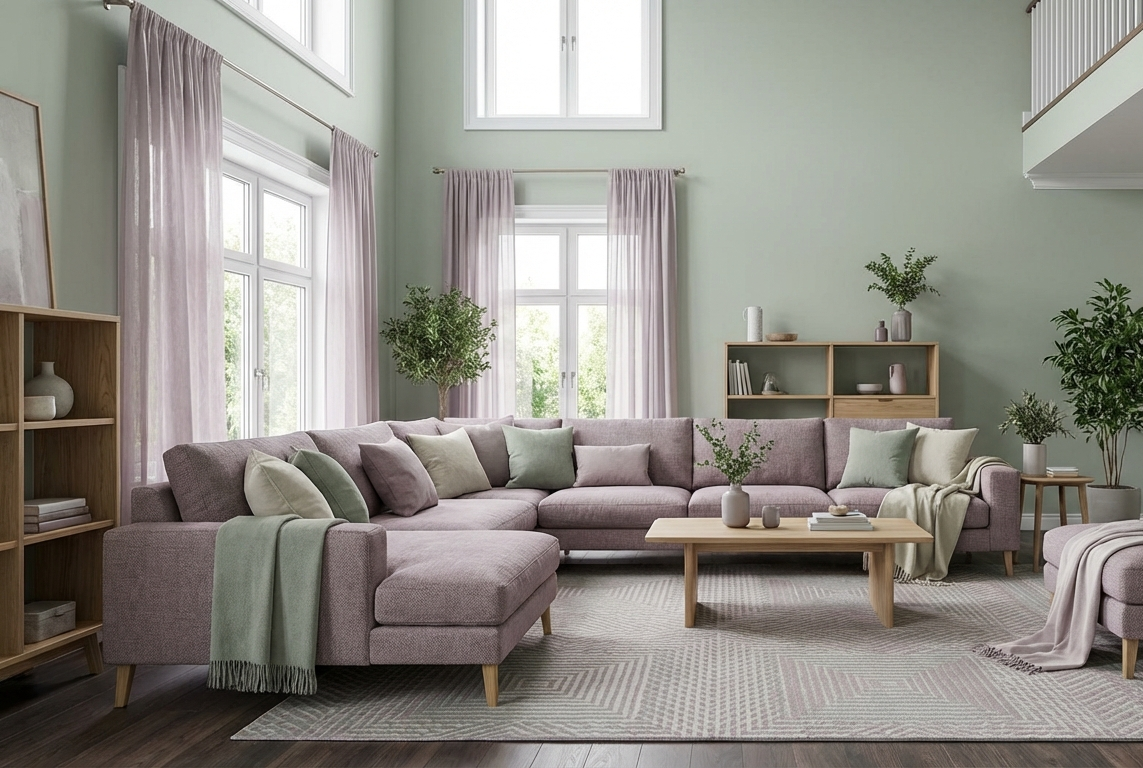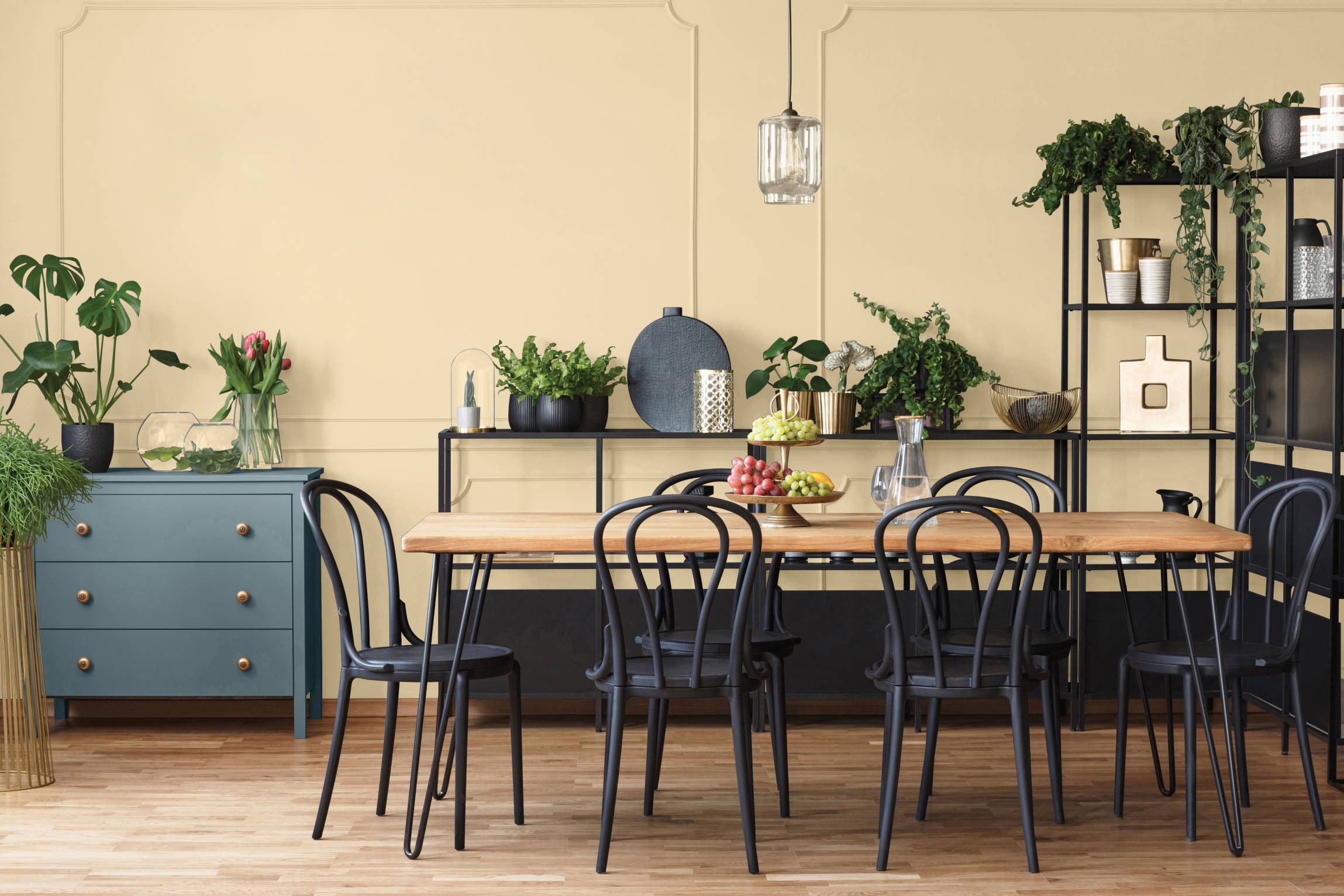
How do you paint a wall in two colours?
You have a brilliant idea: instead of painting your wall in one colour, you are going to create two (or more) colour areas on your wall. Problem: you don't have the steadiest hand and you don't know which colours you can all combine. No need to panic, in this blog post we give you lots of inspiration and tips for the perfect play of colours!
1. Tone-on-tone
Multiple colours on the wall do not always mean a big contrast. Even with the same colour in different shades, you can give your living room, kitchen or bedroom a bit more punch. Even better, it gives your interior a touch of minimal chic. Go for example for shades of white and beige or natural greens. Moreover, you can continue the tone-on-tone trend in the rest of your interior, such as the furniture, the floor and of course the accessories.
2. Colour-blocking
Can things be a little bolder for you? Then colour-blocking is for you. With colour-blocking you mix colours you would normally never combine, such as pink and bright yellow.
When colour-blocking, it is important to match the rest of your interior with the chosen colours on the wall. Also, don't combine too many different colours and still use neutral tones in your interior to keep things in balance.
3. Round and round and round
If straight lines are boring, playful geometric shapes are definitely for you! By painting a large circle or arc in an accent colour, you immediately give your room a completely different look. For the children's room, you can opt for colourful triangles or clouds.
Here too, you can opt for tone-on-tone if you want to keep it a bit quieter, or colour-block if you want to go all the way!
Getting started: how to paint a wall in two colours?
Are you completely convinced? Then it's time for the real thing! Below you will find a step-by-step plan to draw a perfect straight line between two colour surfaces:
- Mark with a pencil where the two colours should touch on the wall.
- Paint the lightest colour to just over the pencil markings. Let the paint dry.
- Move a rope along a piece of white chalk. Stretch the rope at the level of the pencil markings. Secure the rope with tape. Shortly pull the rope towards you (like the string of a guitar), leaving a straight white chalk line on the wall.
- Stick tape to the dividing chalk line.
- Paint with the second colour to just over the edge of the tape.
- Remove the tape while the paint is still wet and admire your wall in two colours!
Did you get started with one of the ideas from this blog post? We are very curious to see the result! Send us a photo via email or share it with us on Facebook or Instagram with #Tintrio.
Looking for some more inspiration? Then be sure to read our blog post on colour fields or contact our experts. They will be happy to help you!
Recent blogs

Integrating the Granny chic style into your home
Granny what? Granny chic! It is the interior trend of 2026. A style full of decorative details, prints and lots of cosiness. Away with sleek and minimalist, hello warmth and nostalgia. In short: an interior style that truly feels like coming home. We explain step by step how you can implement this trend yourself.

New in store: Japanese art colours
In this blog, we take you into the world of refined Japanese colours and show how Tintrio can translate these characterful shades into carefully selected alternative colours. In doing so, centuries-old colour traditions become tangible again in a contemporary context.

The trend colours of 2026 are here!

Showgirl Orange: The Swift-trend that refreshes

Using matte lacquer outdoors? Forget it
Can't find a suitable matte lacquer for exterior use? You're not alone. Many people look for a matt outdoor lacquer for wood., only to end up frustrated. Why is that? We'll explain the reasons behind it.

Is varnish removal really the only option?
You've enjoyed your varnished parquet or table for years, but now you'd like to change the colour. That begs this question: Can you paint over varnish or do the layers of varnish have to be removed first? Unfortunately, varnish removal is the only option here. The same goes if your parquet has a permanent stain. But don't worry, with our tips you can remove varnish without damaging the wood.

Xyladecor renews range and colours

Trend colours for 2025: here they are!
Discover the 2025 trend colours here before anyone else and see how they will transform numerous interiors. By the way, for 2025 we are also unveiling our own Tintrio's Tint of the Year 2025. One thing is already certain about our Tintrio tint: it will be a cheerful colour that will give you a dose of positive energy.

Taupe colours an excellent choice for any home decor
What colour is taupe and why is it so popular in many interiors? Check out our blog and integrate this colour into your home soon. You will also find out here how best to combine taupe.

High-gloss door painting: piece of cake or a challenge?
Learn how to paint a door with a high-gloss paint. With all our tips and tricks, you'll be painting your door without streaks from now on. Whether it is easy or rather difficult? Find out here!

Repair and prevent wood rot with these smart tips
Do you want to paint or stain wood? Then there is one important requirement: the wood must be healthy. But what if your wood suffers from wood rot? Can you repair wood rot at all or does all the wood have to be replaced?
Get all your answers in this blog post. And rest assured, there are tools to save your wood.

The garden trends of 2024 in colours and furniture
Nicer weather on the way! High time to breathe life into the garden with the latest garden trends. Which colours will really stand out in the garden in 2024 and which furniture will score a lot of points this year? Tintrio and Zonnewende notice 4 garden trends. Discover and implement the trends in your own outdoor spaces.

Step into this colourful interior trend of 2024 ... Kitschen!
In this year, the kitshy kitchen trend is circulating. A kitchen style that can be described as eclectic with the most bizarre colour combinations. Every colour can be included. And preferably we see them flashed in their brightest form, really something that reminds you of the 1970s.

Paint with the Product of the Year 2024
Hooray, we simply have the product of the year among our range. Which product are we talking about exactly? Libéron Velours de Peinture! For one year, this paint product may wear the beautiful label that stands not only for quality, but also innovation.
Wondering what makes this paint so unique? Then dive into this blog post.

Spotlighted: Sustainable evolution in paint packaging
One thing is certain: recycled paint buckets are improving the painting industry. But they also bring some questions. Which brands are already packaging paint in recycled plastic? How does this ecological packaging affect the quality of your paint, and does it change the price? These are some questions you may have already dwelled on.
And we are happy to answer them for you!

Listed for you: Unique gifts to impress!
Whether it's for Father's Day, Christmas or a housewarming party. Tintrio has a suitable gift for every occasion. Because even at our paint shop, we like to surprise someone with a colourful moment.
Do you also have a person in your life who deserves a super cool gift? With these gift ideas, you're guaranteed to impress.
finding a gift has never been easier! And who would have thought you would have to go to a paint shop to do that? It is certainly surprising, so there is no lack of originality.

5x colour inspiration for your front door
Your front door is an important greeting place, so it could use a fresh colour. Not sure what door colours are popular anno 2024? We've listed five styles for you!

The new Levis Atelier colours unveiled for you!
With colour you bring individuality to your interior, Levis Atelier knows that better than anyone else. And that's why the brand comes up with five new colour palettes. Whether you like country, modern, serene or vintage, you will find a suitable Levis Atelier colour for every living style.
Immerse yourself now in this colourful blog.

Previous trend colours that are still popular
Check out the beautiful trend colours from previous years. Because these colours not only received accolades, but are a real staple in countless interiors. Wondering which paint colours we are talking about? Take a quick look!

Why good paint materials are so important
Got a painting job ahead of you? Then you better be well prepared and buy the right materials right away.
Because let's face it, a paint brush that leaves hairs behind is not that interesting, is it? The same with a paint roller, it needs to absorb enough paint and ensure as few drips as possible. Well, we help you choose quality material so your paint can really shine!

2024 trend colours? Here they are!

Barbiecore interior trend: How to combine pink?
Pink is trending in living rooms. And there is only one reason for this: the new Barbie movie.
Margot Robbie and Ryan Gosling, the leading actors make everyone dream of a pink Barbie life. You see the colour every day on the streets, in shops, on social media and even in new interiors. Do you also want to live in an over-the-top Barbie world or stick to soft pink shades? Check out our favourite colour combinations with pink and decide which combination best suits your interior.

Three inspiring colour schemes for a grey interior!

















